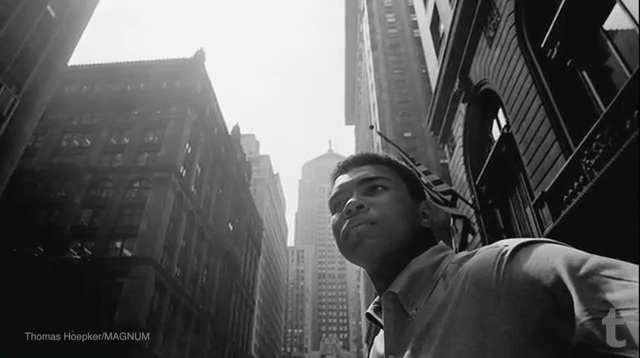Ring In Muhammad Ali's Birthday By Streaming These Movies
By Chuck Sudo in Arts & Entertainment on Jan 17, 2013 11:00PM

Few athletes dominated their chosen sport and captivated a nation like Muhammad Ali, who celebrates his 71st birthday today. While several films have been dedicated to The Greatest of All Time like When We Were Kings, the brilliant Oscar-winning documentary that went behind the scenes of 1974's “Rumble in the Jungle” between an aging Ali and the young, brutal George Foreman, others tend to focus on Ali the character rather than the man behind the mouth. None of them truly dig deep into Ali’s political awakening, his conversion to Islam and time with the Nation of Islam, and his complicated life outside the ring.
Kartemquin Films is working on The Trials of Muhammad Ali, a documentary that focuses on his life away from boxing that, earlier this week, received a $160,000 grant from the Ford Foundation’s Just Films initiative. (Time and extra funding willing, Kartemquin hopes the film will be ready for release later this year.)
At a screening of the in-progress film at the Harold Washington Library last November, director Bill Siegel and producer Rachel Pikelny showed a rapt audience clips from the film that included comments from Nation of Islam leader Louis Farrakhan. Pikelny told Chicagoist via email she believes this is the first time Farrakhan has spoken on the record about Ali and his time in the Nation, which will be a major hook for publicizing the film once it’s released.
Until then, we have to satisfy ourselves with these films that are available through legal streaming websites to pay tribute to Ali on his special day.
When We Were Kings: Until verdict is placed on The Trials of Muhammad Ali when it's released, the gold standard for Ali documentaries remains When We Were Kings. There's so much to digest here: the differences between Ali and Foreman in popularity and how they connected with the people of Zaire; Don King's presence casting a shroud over the fight (it was King's first major promotion); the concerts in Zaire performed by B.B. King and James Brown; and the questionable decision to hold the fight in Zaire during the bloody dictatorship of Mobutu Sese Seko. (VEOH)
A.K.A. Cassius Clay This film captures Ali at arguably the lowest point in his professional career. During this period he made a living making public speaking engagements as he fought to obtain licensees to box again; no venue or price was too low. This film sprung from a failed attempt to bring Ali to Broadway and pits him against legendary trainer Cus D'Amato—a father figure to a young Mike Tyson—as they debate whether Ali could beat the boxing legends that came before him. This is a classic matchup of talkers and D'Amato holds his own against the Louisville Lip. (Netflix)
Muhammad Ali: Made in Miami: This PBS documentary comes closest to date at looking at the catalyst behind Ali's religious and political transformations, as he trains for his first bout with Sonny Liston. Before Liston, Cassius Clay was seen as a motormouth self-promoter. But the racism he dealt with in Miami leading up to the fight convinced him he had nothing to lose by speaking his mind. Once America discovered Ali's friendship with Malcolm X and his ties to the Nation of Islam, he was no longer seen as another huckster—he was a threat. (Netflix)
30 for 30: Muhammad and Larry: Money talks, even for a 38-year-old Muhammad Ali, who came out of retirement in an attempt to win the World Heavyweight Title for a fourth time against former sparring partner Larry Holmes. This ESPN documentary looks at the buildup to the Ali-Holmes bout in Las Vegas and shows Ali's struggles trying to get in shape for the fight. Ali publicly blamed his poor performance on thyroid medication he was taking to lose weight. While training for the bout, Ali's slurred speech and shaking hands betrayed the initial signs of the Parkinson's Syndrome that would later make him a prisoner in his own body; the beating he took from Holmes only helped facilitate it. Ali's longtime trainer Angelo Dundee stopped the fight in the 10th round. But it's the respect Holmes shows for his former boss, even as he craved recognition from the boxing public, that is probably the saddest moment of this film, and left him as scarred mentally today as Ali is physically. (Netflix)
Related
Muhammad Ali Brags, Talks Of Fighting Martians In 1966 "Lost" Interview